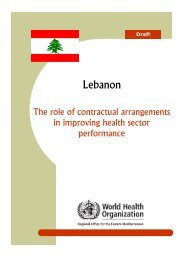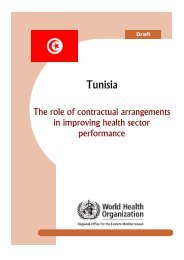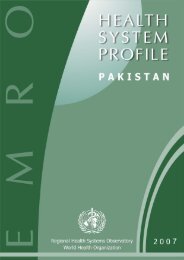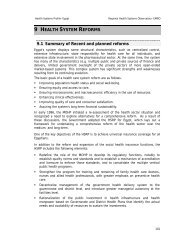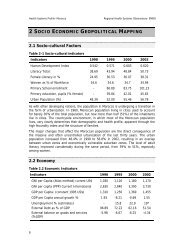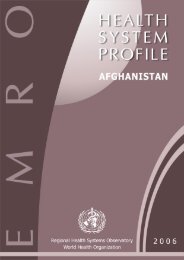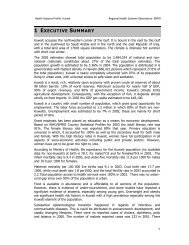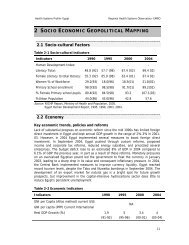The role of contractual arrangements in improving health sector ...
The role of contractual arrangements in improving health sector ...
The role of contractual arrangements in improving health sector ...
Create successful ePaper yourself
Turn your PDF publications into a flip-book with our unique Google optimized e-Paper software.
Pakistan<br />
<strong>The</strong>re may be a potential conflict between efficiency requirements <strong>of</strong> the market<br />
environment and equity goals, which may act to underm<strong>in</strong>e equity goals. This may <strong>in</strong>clude<br />
loss <strong>of</strong> comprehensiveness <strong>of</strong> local service provision and potential loss <strong>of</strong> consumer choice.<br />
Equity may also be threatened through the practice <strong>of</strong> provider or purchaser selection <strong>of</strong> low<br />
risk patients where payment does not adequately compensate for the level <strong>of</strong> risk <strong>of</strong> specific<br />
patients or types <strong>of</strong> patient.<br />
Selective contract<strong>in</strong>g may also have substantial impact on the wider <strong>health</strong> system.<br />
Introduction <strong>of</strong> contracted providers may lead to fragmentation or lack <strong>of</strong> coord<strong>in</strong>ation with<strong>in</strong><br />
the broader public <strong>health</strong> system. Contract<strong>in</strong>g could also lead to competition between<br />
contractors and public providers for staff resources, lead<strong>in</strong>g to <strong>in</strong>creased salaries and to public<br />
hospitals be<strong>in</strong>g dra<strong>in</strong>ed <strong>of</strong> key personnel, or suffer<strong>in</strong>g from <strong>in</strong>creased staff turnover. Contracts<br />
can lock scarce resources <strong>in</strong>to a particular allocation, even when changed circumstances<br />
dictate a reallocation.<br />
SCOPE, OBJECTIVES AND METHODOLOGY<br />
<strong>The</strong> scope <strong>of</strong> this study is to undertake situation analysis, <strong>in</strong>clud<strong>in</strong>g exploratory case<br />
studies, and document experiences as well as recommendations for outsourc<strong>in</strong>g <strong>of</strong> publicly<br />
f<strong>in</strong>anced <strong>health</strong> services to private <strong>sector</strong> organizations <strong>in</strong> Pakistan. <strong>The</strong> study <strong>in</strong> Pakistan is<br />
part <strong>of</strong> a regional <strong>in</strong>itiative to develop an evidence-based regional strategy on public–private<br />
partnership <strong>in</strong> <strong>health</strong> <strong>in</strong> the Eastern Mediterranean Region.<br />
<strong>The</strong> objectives <strong>of</strong> the study are to review the <strong>arrangements</strong> and experiences <strong>of</strong><br />
“contract<strong>in</strong>g out” and provide recommendations for future programm<strong>in</strong>g by:<br />
assess<strong>in</strong>g the environment and overall capacity <strong>of</strong> providers and purchasers <strong>in</strong> terms <strong>of</strong><br />
contract<strong>in</strong>g out <strong>health</strong> services to the private <strong>sector</strong>, its implementation as well as<br />
evaluation;<br />
assess<strong>in</strong>g the <strong>arrangements</strong> and experiences <strong>of</strong> a project/programme <strong>in</strong> <strong>health</strong> that has taken up<br />
<strong>contractual</strong> <strong>arrangements</strong> as an implementation modality; and<br />
discuss<strong>in</strong>g f<strong>in</strong>d<strong>in</strong>gs on <strong>contractual</strong> <strong>arrangements</strong> with the key stakeholders to <strong>in</strong>form the study<br />
recommendations.<br />
<strong>The</strong> qualitative study uses a mix <strong>of</strong> methods to address the multiplicity and complexity<br />
<strong>of</strong> dimensions <strong>of</strong> the <strong>contractual</strong> <strong>arrangements</strong> for <strong>health</strong> services. <strong>The</strong> methods used <strong>in</strong> the<br />
study are: a) literature review; b) focus group discussion; c) key <strong>in</strong>formant <strong>in</strong>terview; d) case<br />
study; and e) a consensus-build<strong>in</strong>g workshop.<br />
a) Literature review<br />
<strong>The</strong> relevant <strong>in</strong>ternational and national literature was identified through library and<br />
<strong>in</strong>ternet searches. <strong>The</strong> literature was screened and relevant material was selected for <strong>in</strong>-depth<br />
review by the researcher. <strong>The</strong> documented <strong>arrangements</strong> and experiences <strong>in</strong> the countries<br />
were reviewed to identify key areas <strong>of</strong> <strong>in</strong>formation about various dimensions <strong>of</strong> <strong>contractual</strong><br />
<strong>arrangements</strong>. <strong>The</strong> guidel<strong>in</strong>es and schedule for focus group discussion and key <strong>in</strong>formant<br />
<strong>in</strong>terviews were developed, <strong>in</strong> the light <strong>of</strong> literature review.<br />
206



